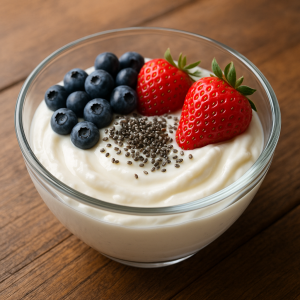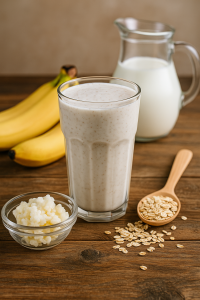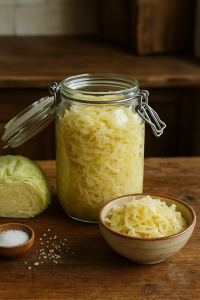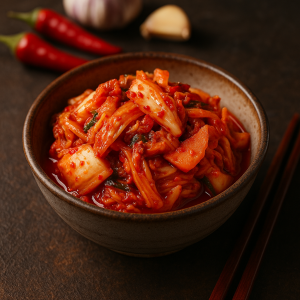Superfoods for gut health aren’t just trendy buzzwords — they’re the real deal when it comes to feeling lighter, sharper, and more energetic. Have you ever wondered why some days you feel unstoppable, while other days even climbing out of bed feels like a workout? Most of the time, the answer lives in your gut.
Think of your digestive system as more than a food-processing machine. It’s like a bustling city, packed with trillions of tiny workers (aka the gut microbiome) who clock in day and night. When that city is thriving, you feel clear-headed and energetic. When it’s overwhelmed with junk food or stress? You’re left bloated, cranky, and exhausted.
Here’s the truth: boosting energy with diet starts in the gut. Coffee and sugar might give you a quick rush, but if your microbiome isn’t nourished, that energy fades fast. The right gut-friendly superfoods fuel good bacteria, balance digestion, and help you power through your day without the dreaded crash.
Researchers at Harvard Health confirm that gut bacteria influence immunity, energy levels, and even mood. That means your plate isn’t just feeding you — it’s feeding your microbiome too.
So, if you’re ready to discover the superfoods for gut health that actually work and keep your energy steady all day long, let’s dive in.
Superfoods for Gut Health: 10 Foods That Actually Work
Here’s the deal: I’m not going to bore you with rare, can’t-find-anywhere ingredients. These are practical, everyday gut-friendly superfoods that you can actually buy at your local grocery store.
1. Yogurt – Creamy Probiotic Power

Yogurt isn’t just breakfast filler. Plain, unsweetened yogurt is one of the best digestive health foods around because it’s full of natural probiotics like Lactobacillus and Bifidobacterium. These little guys restore balance in your microbiome, easing digestion and boosting immunity.
👉 Pro tip: Skip the sugary “fruit at the bottom” cups. They undo the benefits. Instead, add fresh berries, honey, or chia seeds for flavor.
Personal note: When I swapped cereal for a yogurt bowl in the mornings, my mid-morning energy crash disappeared. True story.
2. Kefir – Yogurt’s Cooler Cousin

Kefir is like yogurt, but thinner, tangier, and packed with even more probiotic strains — sometimes 30+ in one glass! It’s a true fiber-rich superfood (yes, it’s dairy, but the fermentation makes it gut-friendly for many who can’t handle milk).
👉 Quick hack: Blend kefir with bananas and oats for a breakfast that keeps you steady until lunch. Check out our gut-friendly smoothie recipes for ideas.
Fun fact: Kefir actually originated in the Caucasus Mountains and was once considered a “gift from the gods.” No wonder it feels magical.
3. Kimchi – Spicy, Crunchy, Alive

Kimchi is basically fermented cabbage with spices, garlic, and ginger. It’s fiery, flavorful, and full of foods that improve digestion thanks to fermentation.
- Probiotics from fermentation.
- Antioxidants from vegetables.
- A metabolism kick from chili.
Personal take: My first bite of kimchi almost made me cry (too spicy 😅). But after giving it a second chance, it’s now a fridge staple.
4. Sauerkraut – Funky but Fantastic

Sauerkraut (fermented cabbage again, but less spicy) is one of the oldest gut-friendly superfoods. Europeans have been eating it for centuries to aid digestion and boost immunity.
👉 Add it to sandwiches, hot dogs, or salads. Cheap, easy, and surprisingly tasty once you get used to it.
Cool fact: Raw sauerkraut contains live bacteria. The pasteurized kind? Not so much. Always check the label.
5. Bananas – The Underrated Hero
Bananas look boring. Too simple. But here’s the kicker: they’re loaded with prebiotic fiber, which acts like fertilizer for the good bacteria in your gut.
- Gentle on the stomach.
- Honestly, the potassium is great, but it’s the natural sugars that give you that quick ‘I’m awake again’ boost.
- Easy to grab on the go.
👉 Snack idea: banana + almond butter = steady energy without the crash. I ditched my 3 p.m. cookie for this combo, and it was a game changer. Find more gut-friendly snack ideas here.
6. Oats – Slow and Steady Fuel
Oats are the fiber-rich superfoods your microbiome craves. They’re high in beta-glucan, a soluble fiber that keeps digestion smooth and lowers cholesterol.
👉 Make overnight oats with kefir, chia, and blueberries. It’s basically a gut-loving parfait in a jar.
Science check: According to Mayo Clinic, adults should aim for 25–35g of fiber daily, but most people get less than half. Oats make it easy to close that gap.
7. Garlic – Flavor with Benefits
Garlic does way more than just make food smell amazing. It’s a natural prebiotic, which means it feeds the good bacteria in your gut so they can thrive and do their job properly. When your gut bacteria are well-fed, your digestion improves, your immune system gets stronger, and your body fights inflammation more effectively. That’s a lot of power packed into one little clove.
And let’s not forget the traditional wisdom. Story time: my grandma used to swear by garlic tea whenever anyone in the house had a stomach ache. I thought it was pure torture — the smell alone nearly knocked me out. But guess what? It worked. After a few sips, the pain eased, and I realized there’s a reason garlic has been used in natural remedies for centuries. Sometimes the weirdest old-school cures really are the best.
Garlic also plays a role in keeping your energy up. Since it supports digestion and helps your body absorb nutrients better, it indirectly contributes to how energized you feel throughout the day. That’s why cultures around the world — from Mediterranean diets to Asian cooking — use garlic as more than just a flavor booster.
👉 How to use it:
-
Add raw garlic to homemade salad dressings for a bold kick.
-
Toss it into stir-fries, pasta, or soups to deepen the flavor.
-
Roast whole cloves until golden and soft for a sweeter, almost nutty taste that spreads like butter.
-
Or, if you’re brave, try a garlic tea once in your life — it may surprise you.
At the end of the day, garlic isn’t just seasoning. It’s one of the most accessible and affordable gut-friendly superfoods out there — and your microbiome loves it.
8. Almonds – Crunchy Energy Boost
Almonds are the snack that work double duty: they provide healthy fats, antioxidants, and fiber that fuels your gut and body.
- Increase microbiome diversity.
- A handful keeps the hunger gremlins quiet for way longer than chips ever do.
- Deliver vitamin E for skin health.
👉 My go-to road trip snack? A bag of roasted almonds. No crashes, no greasy fingers. Try more almond snack recipes
9. Chia Seeds – Tiny but Mighty
Chia seeds are small but powerful. Once they hit liquid, they swell up into a gut-friendly gel that aids digestion.
- Insanely high in fiber.
- Packed with omega-3s.
- Add plant protein to meals.
👉 Make chia pudding with almond milk + honey. Dessert? Yes. Gut support? Also yes. Learn more about Chia Recipes For Gut Health.
10. Spinach – Green Gut Fuel
Spinach may not grab headlines like exotic superfoods, but don’t underestimate it — this leafy green is a quiet powerhouse. It’s loaded with fiber, antioxidants, and iron, all of which keep your gut city running smoothly and your energy levels steady throughout the day. Fiber feeds your good gut bacteria, antioxidants fight off oxidative stress, and iron supports healthy blood flow so your body can stay energized.
And the best part? Spinach is ridiculously versatile. You can toss it into smoothies (promise, you won’t even taste it), fold it into omelets, mix it into pasta, stir it into soups, or simply sauté it with garlic and olive oil for a quick side dish. It’s the kind of ingredient that works hard in the background without making a fuss.
Fun fact: A single cup of raw spinach has about 4 grams of fiber and over 50% of your daily vitamin A, according to Harvard Health. That’s a serious nutrient punch from a handful of leaves! Plus, spinach also contains magnesium, which supports muscle function and plays a role in keeping digestion smooth.
Personally, I used to think spinach was boring — until I discovered green smoothies. One banana, a scoop of yogurt, some chia seeds, and a handful of spinach later… boom! A breakfast that actually tastes good and leaves you feeling energized, not sluggish.
👉 Easy ways to add spinach to your diet:
-
Blend into fruit smoothies for a hidden nutrient boost.
-
Mix into scrambled eggs or omelets for breakfast.
-
Toss raw leaves into wraps, sandwiches, or salads.
-
Sauté with garlic and olive oil for a quick, flavorful side.
-
Stir into soups, curries, or stews near the end of cooking.
Spinach is proof that sometimes the simplest, cheapest foods are the most powerful. For gut health, energy, and overall wellness, this green really pulls its weight.
How to Eat Gut-Friendly Superfoods Without Stress
You don’t need a 30-step meal plan. Just weave these into your day. Here’s a simple Healthy Gut Diet example:
- Breakfast: Overnight oats with yogurt, banana, and chia.
- Snack: Kefir smoothie with berries.
- Lunch: Spinach salad with garlic dressing, kimchi on the side.
- Snack: Almonds.
- Dinner: Grilled chicken with sauerkraut and roasted veggies.
👉 Easy swaps, zero overwhelm.
Fiber-Rich Superfoods: Why They Matter
Fiber is the unsung hero of nutrition for gut health. Without it, probiotics starve.
- Soluble fiber (oats, chia, bananas) = slows digestion, stabilizes energy.
- Insoluble fiber (spinach, almonds) = adds bulk, prevents constipation.
One review I found on PubMed pointed out that fiber-rich diets can actually shift your microbiome in a matter of weeks — less inflammation, more diversity.
👉 Translation: more plants = happier gut + more energy.
Natural Probiotics vs Supplements
Do you need supplements? Maybe, but food-first is usually better.
- Food: Yogurt, kefir, kimchi = probiotics + extra nutrients.
- Supplements: Can work if you’ve got restrictions, but honestly? They’ll never beat the taste of real food.
As one nutritionist put it: “You can’t out-supplement a bad diet.” Couldn’t agree more.
Boosting Energy With Diet — What Most People Get Wrong
Most people think energy comes from caffeine shots, sugary snacks, or those flashy “energy drinks.” Sure, they give you a buzz… but only for about 20 minutes. Then comes the dreaded crash. Sound familiar? That shaky, tired, “why did I eat that?” feeling? That’s the price of a quick fix.
Here’s the truth: boosting energy with diet isn’t about grabbing a candy bar at 3 p.m. It’s about choosing foods that release energy slowly and actually support your gut at the same time. When your gut bacteria are fed properly, they help regulate blood sugar, absorb nutrients more effectively, and keep your energy steady.
That’s why gut-friendly superfoods like bananas, almonds, and oats are such game changers. Bananas provide quick natural sugars plus prebiotic fiber that keeps digestion smooth. Almonds bring healthy fats and protein, which help you feel full longer. And oats? They’re the slow-burn carb your body loves, keeping you powered for hours instead of minutes.
👉 Try this swap:
-
Trade your mid-morning soda for a kefir smoothie. You’ll get probiotics, protein, and a steady energy lift.
-
Replace chips with a handful of almonds. No grease, no crash, just lasting fuel.
-
Swap a sugary granola bar for overnight oats with chia and fruit. Dessert vibes, but gut-friendly.
Bottom line? If you want consistent energy, don’t chase the high. Feed your gut right, and it’ll feed you back with stamina, focus, and fewer afternoon slumps.
Lifestyle Hacks That Support Gut Health
Food matters, but let’s be real — your gut doesn’t work in isolation. What you eat is powerful, but your everyday habits can make or break how well those superfoods do their job. Think of your gut as a sensitive friend: it thrives when you treat it right, and it acts up when you don’t.
Hydration. Water is your gut’s best buddy. It keeps everything moving, prevents constipation, and helps nutrients absorb better. (And FYI, coffee and soda don’t count — in fact, too much of them can dehydrate you.) Keep a water bottle nearby and sip throughout the day instead of chugging it all at once.
Sleep. Your gut has its own clock — yes, gut bacteria follow circadian rhythms too. When you skimp on sleep, your microbiome feels the chaos. Poor sleep is linked to imbalanced bacteria and even sugar cravings the next day. Aim for 7–9 hours and try to keep your bedtime consistent.
Stress. Ever had “butterflies” before a big meeting or an upset stomach during stressful times? That’s your brain and gut chatting. Chronic stress keeps your gut in survival mode, which slows digestion and causes inflammation. Small things like deep breathing, journaling, or a short walk can calm your nervous system and, in turn, your gut.
Exercise. You don’t need a marathon to make your gut happy. Even a 20–30 minute walk can improve digestion, reduce bloating, and help regulate bowel movements. Plus, physical activity encourages the growth of healthy bacteria. It’s a win for both body and microbiome.
👉 Think of it like this: gut health is a team sport. The food you eat is the star player, but hydration, sleep, stress management, and movement are the teammates that make the win possible. When they all work together, your gut thrives — and so does your energy, mood, and overall health.
A Relatable Gut Story
Confession: I used to live on coffee and muffins. By noon, I was foggy and bloated.
Then I tried swapping breakfast for oats with yogurt and chia. I added kefir smoothies a few times a week. Within weeks, the difference was insane — more energy, no afternoon slump, even clearer skin.
👉 Point is: you don’t need perfection. Just start with one small swap.
FAQs
What are the best superfoods for gut health?
Yogurt, kefir, kimchi, oats, bananas, almonds, chia seeds, spinach, garlic, and sauerkraut.
If I wanted to eat foods that improve digestion daily, which ones should I actually pick?
Bananas, oats, and spinach — also listed in our gut-friendly diet plan.
Are natural probiotics better than fiber-rich superfoods?
They work together: probiotics add bacteria, fiber feeds them. (Mayo Clinic explains here).
Can I build a healthy gut diet on a budget?
Absolutely. Oats, bananas, garlic, and spinach are cheap and effective — see our budget-friendly gut meals.
Do gut-friendly superfoods really boost energy?
Yes! They stabilize blood sugar, unlike sugar-heavy snacks that crash you. Learn more in our energy-boosting meals section.
How do digestive health foods actually affect overall wellness?
They improve nutrient absorption, reduce inflammation, and fuel your body better. Harvard Health backs this up.
Final Thought
Your gut isn’t just about digestion — it’s the engine behind your energy, immunity, and mood. These superfoods for gut health aren’t fancy. They’re simple, affordable, and powerful.
Start small. Add one of these foods to your next meal. Notice how you feel.
👉 For more gut-friendly cultural recipes, visit us today. Your gut (and your energy) will thank you.
